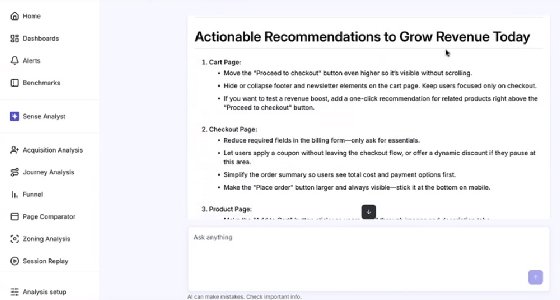
Contentsquare previews agentic AI-driven content analytics
Content analytics can be complicated, but natural language and agentic AI can simplify the process.
Customer experience is evolving with AI -- especially in the browser, where AI summaries replace clicks to web pages.
As such, content analytics technology must keep up. Marketers need to be able to follow the traffic, both to maximize traffic to their sites -- what's left of it -- and to understand how agents process the content on their sites for summaries as they act as third parties interacting with marketing content.
Web content management leaders such as Adobe and Sitecore are building AI tools into their platforms to tackle the changing dynamics of site traffic caused by large language models such as Google Gemini and ChatGPT.
Contentsquare, a content analytics vendor that claims consumer brands such as ASICS, Bose and Rakuten among its customers, as well as B2B companies such as RingCentral and Zoom, previewed its Sense Analyst tool that is going into beta today.
Content analytics is a complicated process often performed by data analysts after mapping websites, examining customer behavioral data and summarizing findings into reports for marketers. Sense Analyst automates these processes.
Generative AI tools such as Sense Analyst, which can turn simple natural language queries along the lines of "How can I improve revenue today?" or "Where am I losing customers?" into actionable advice, moves that process closer to the front lines, said Tapan Patel, Research Director, Customer Data and Analytics, IDC. It can help people without technical backgrounds build reports where previously they might not have even known where to start, said Rachel Obstler, interim chief product officer at Contentsquare.

"Content creators, marketers, people who are designing experiences -- many of them are not experts in analytics," Patel said. "Tools [with] natural language-based interfaces will definitely help both on the query side -- and on the explanation side, because once you generate a visual, some kind of an analytic map or a chart, you also want an explanation of what's going on."
Figuring out how AI search agents interact with content -- and summarizing how well they're doing it -- is another relatively new job for content analytics systems to tackle. But Obstler said conversational intelligence and sentiment analysis can measure the job these third-party search agents are doing.
"What's happening is not only summarization, but action is happening outside of [a company's] website," Obstler said. "You can go to ChatGPT and say, 'Plan me a vacation,' and you're never even going to the travel company's website."
To tackle this problem, Contentsquare also plans to add analytics capabilities for channels such as voice and chat with the acquisition of Loris AI, which has built many different AI models for customer sentiment analysis. Users will be able to understand how agents are performing, and what the opportunities are for improving them -- along the lines of a serverless voice of the customer tool, she added.
The Loris acquisition is expected to close next month. It will be Contentsquare's ninth acquisition in the last six years. Company founder and CEO Jonathan Cherki said the ultimate goal is to build a next-generation, agent-based digital experience platform.
"We think that there will be agents on the website working on the front end with customers, but they will also work on the back end with other agents," Cherki said. "The ecosystem will be more connected, so that will help to have a much better online experience, a more personalized experience; you will see business model evolving from 'software as a service' to 'site as a service' or 'result as a service' or even 'outcome [as a service].'"
Don Fluckinger is a senior news writer for Informa TechTarget. He covers customer experience, digital experience management and end-user computing. Got a tip? Email him.








